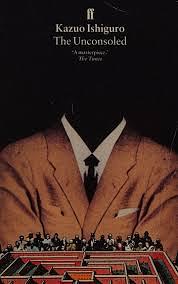You need to sign in or sign up before continuing.
Take a photo of a barcode or cover
challenging
mysterious
reflective
tense
slow-paced
Plot or Character Driven:
A mix
Strong character development:
Yes
Loveable characters:
No
Diverse cast of characters:
No
Flaws of characters a main focus:
Yes
Engrossing and maddening. Some tropes got a little repetitive, but there is a lot to enjoy here.
Ishiguro is becoming a long-standing auto-buy author for me; I greatly enjoyed Never Let Me Go and Klara and the Sun and was hoping this next read would follow suit. I saw reviews speaking of The Unconsoled being weird and wonderful and bordering on the Kafkaesque and this only intrigued me more. Upon reading however, I found this book to be readable but not particularly exciting. The mood is indeed surreal but the messages seem too buried in absurdity to properly unearth. I enjoyed some of the conceptual themes about the unconsole villagers Ryder meets but overall just felt immense frustration at the constant back-and-forth with little resolution. None of the characters are likeable (nor do I think they are meant to be) and I found no great satisfaction in reaching the end. I suppose I can understand why some readers reveal in this bizarre journey but I was not one of them. Definitely one of Ishiguro's more divisive books!
Ishiguro is one of my favorite authors but I hated this. I just read Number9Dream by David Mitchell, who I also usually love, and they felt very similar. And there's even a lot of references to number nine in this book. Both play with dreams and memories and both were excruciating to get through.
I have no idea what I just read. You know that dream in which you suddenly learn you have another exam, in a class that you don't remember signing up for, and certainly know nothing about? And you get swept along, without any control, and you look down, and your clothes are missing, and everything is happening to you (I mean, nothing is under your control) ... that dream? those dreams? I think that's what this was. Maybe?
Ryder has arrived in a city somewhere, apparently to give a piano performance, and this novel tells the story of the days leading up to (and the day of) the performance.
It's a good thing I didn't read anything about this book before I started. I was naive. I had no expectations, only prior experience with other books of his. And so I assumed: unreliable narrator and obsession with memory. It's Ishiguro. But pretty soon, I started to wonder about my own sanity. (Gaslighting by an author, that's clever.) People were acting weirdly. People don't really talk like this, do they? They don't behave like this? Perhaps it's just the unreliability of the narrator, I thought, but can he be this unreliable? I mean, you don't go a long ways in a city and then discover a door that leads right back to the first floor of your own hotel, do you? Pretty soon I was doubting myself and even asked my husband to double check that Clint Eastwood actually wasn't in 2001: A Space Odyssey , and that's when I knew I was in trouble. Or, rather, when I knew that it was Ishiguro, that it was meant to be off in some way, and the real question is why.
I thought it was fantastic, but I do understand why some critics felt it to be an immense practical joke. Ryder was just along for the ride, I think, in this story. Swept along by the narrative over which he had literally no control. Did he ever do anything, take action, in any real sense? I think he was swept along the whole time. By other people's expectations, in part, but also by whatever crossed his field of vision. Is it supposed to be a dream? I don't think so, but I know now that some people do.
Anyway, I have no idea what I just read, but it was excellent none the less.
Ryder has arrived in a city somewhere, apparently to give a piano performance, and this novel tells the story of the days leading up to (and the day of) the performance.
It's a good thing I didn't read anything about this book before I started. I was naive. I had no expectations, only prior experience with other books of his. And so I assumed: unreliable narrator and obsession with memory. It's Ishiguro. But pretty soon, I started to wonder about my own sanity. (Gaslighting by an author, that's clever.) People were acting weirdly. People don't really talk like this, do they? They don't behave like this? Perhaps it's just the unreliability of the narrator, I thought, but can he be this unreliable? I mean, you don't go a long ways in a city and then discover a door that leads right back to the first floor of your own hotel, do you? Pretty soon I was doubting myself and even asked my husband to double check that Clint Eastwood actually wasn't in 2001: A Space Odyssey , and that's when I knew I was in trouble. Or, rather, when I knew that it was Ishiguro, that it was meant to be off in some way, and the real question is why.
I thought it was fantastic, but I do understand why some critics felt it to be an immense practical joke. Ryder was just along for the ride, I think, in this story. Swept along by the narrative over which he had literally no control. Did he ever do anything, take action, in any real sense? I think he was swept along the whole time. By other people's expectations, in part, but also by whatever crossed his field of vision. Is it supposed to be a dream? I don't think so, but I know now that some people do.
Anyway, I have no idea what I just read, but it was excellent none the less.
emotional
funny
mysterious
reflective
tense
slow-paced
Plot or Character Driven:
Character
Strong character development:
Yes
Loveable characters:
Yes
Diverse cast of characters:
Yes
Flaws of characters a main focus:
Yes
slow-paced
The Unconsoled is a surreal and perhaps unsettling novel that seems poised to be disliked but quickly becomes entirely engrossing. I could spend hours discussing possible interpretations, but I will simply say that this strangely daunting yet invigorating book is certainly worth the effort of reading.
I love Ishiguro, and I loved all the critical literature about this book. I also loved the themes of memory and regret, forgiveness, forgetting and sorrow, mistakes and woundedness. Near the end of the book, Mrs. Hoffmann’s monologue about how she has dreams of “incredible tenderness” shortly before waking up, and determines to set about life differently, only to be thwarted daily by some “force” could have been channeled from my diary. The last 150 pages of this book improve and manage to re-engage the reader but for the most part the story is a frustrating slog as the protagonist is led about by the nose. There is an emotional reward, but I’d recommend the book only to true Ishiguro fans.





